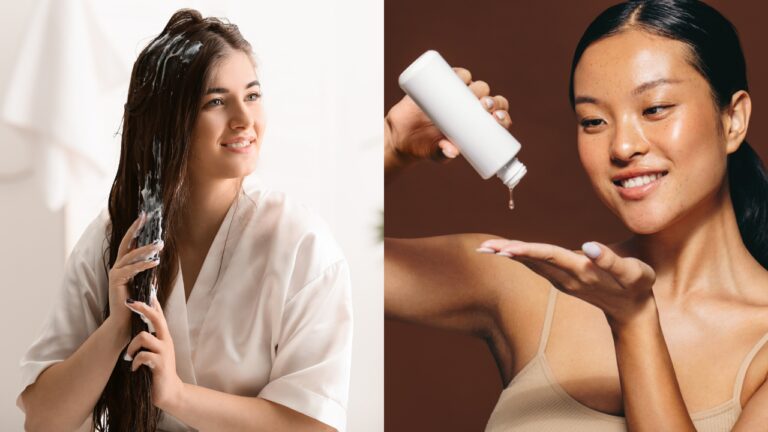A popular line from Poet Percy Bysshe Shelley’s poem “Ode to the West Wind” says, “When winter comes, will spring be far away?” It just means it’s not far away. Similarly, winter skin care issues can be solved with proper care. During the cold season, not only dry skin but also dry hair and scalp are prevalent, leading to skin irritation and damage. It is important to take a specialized skin care routine while providing sufficient moisture.
But to understand what your skin and hair need as the weather changes, we spoke to cosmetic surgeon Dr. Shweta Mishra, a facial and cosmetic surgeon at Shalva Clinic in New Delhi.
To maintain a vibrant and healthy look as the seasons change, you need to take proper care of your skin and hair. “Both skin and hair are greatly affected by weather changes, as differences in environmental conditions can strip the skin of moisture, increase oil production, and cause inflammation and damage,” says Dr. Mishra. I say.
Here are Dr. Mishra’s tips on how to effectively manage these changes and the best hair care products and skin care ingredients to utilize.
hydration is key
For your skin: During the change of seasons, especially in winter, the air becomes dry and your skin tends to lose moisture. To combat this, you need a high-quality medical-grade moisturizer. Hyaluronic acid, glycerin, and ceramides are examples of ingredients that lock in moisture and prevent dryness and irritation. Use a light, oil-free moisturizer during warm weather to prevent pore clogging. For your hair: Just like your skin, your scalp can become dry and irritated during the winter, leading to dandruff. Use moisturizing, sulfate-free conditioners and shampoos. Look for ingredients like jojoba oil and argan oil that nourish your scalp without weighing your hair down.
Adjusting your cleansing routine
For your skin: During cold weather, your skin produces less oil, so harsh cleansers can strip your skin of even more needed moisture. Choose a gentle, non-foaming cleanser that won’t disrupt your skin’s natural barrier. During the warmer months, your skin tends to produce more oil, so a foaming or salicylic acid-based cleanser may be a good choice to prevent breakouts and keep your pores clear. For hair: Over-washing can strip your hair of its natural oils, especially in cold weather. It is important to wash less often and choose a gentle, moisturizing shampoo. During humid, warm weather, your scalp increases oil production, so using a cleansing shampoo once a week can help prevent oil buildup and keep your scalp healthy.
Sunscreen is a must
For your skin: Sunscreen shouldn’t be seasonal. Harmful UV rays can penetrate through clouds and cause premature aging and pigmentation, increasing your risk of skin cancer. Use a broad-spectrum SPF of 30 or higher, even during winter and on cloudy days. During warm weather, it’s important to reapply sunscreen frequently, especially if you sweat or swim outdoors. For hair: Exposure to UV light can also damage your hair, making it brittle and dry. To protect your hair from the sun, wear a hat or use hair products that contain UV filters.
Targeted treatments for weather-specific problems
For your skin: During the colder months, your skin may benefit from professional treatments such as chemical peels, microneedling, and laser resurfacing to combat the dryness, dullness, and sun damage that’s built up from the summer. In the summer, focus on treatments that reduce oil and acne, such as salicylic acid peels and LED light therapy. For hair: Cold, dry air makes your hair frizzy and prone to breakage. Consider using a leave-in conditioner or deep conditioning mask once a week to restore moisture. During hot, humid weather, using a lightweight serum or anti-frizz spray can help keep your hair smooth and manageable.
diet and supplements
For skin: Omega-3 fatty acids, vitamins C and E, and antioxidants protect skin from within, help moisturize, and reduce inflammation. Consider supplements that support skin hydration and elasticity, such as collagen peptides. For hair: Nutrients like biotin, zinc, and vitamin D are essential for healthy hair growth. Make sure your diet is rich in these vitamins, or consider a high-quality hair supplement recommended by your doctor.
Don’t forget to exfoliate
For skin: Regular exfoliation helps remove dead skin cells, which accumulate more quickly in cold weather. However, be careful not to over-exfoliate as this can cause sensitivity and irritation. Consider using alpha hydroxy acids (AHA) or beta hydroxy acids (BHA) in your skin care routine for controlled and safe exfoliation. For hair: Exfoliating your scalp can also help. Scalp exfoliation removes dead skin cells and product buildup that can clog hair follicles and inhibit healthy hair growth. Look for a scalp scrub or treatment designed for this purpose.
Source link

